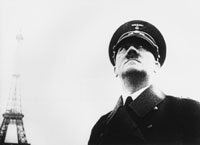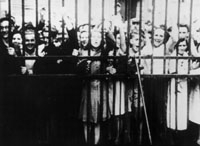February 16, 2001
“The Holocaust and Cinema” to be topic of symposium at Middlebury College March 3-13
Film screenings and lectures are free and open to the public
MIDDLEBURY, Vt.-Middlebury College will host a symposium-“The Holocaust and Cinema”-Saturday, March 3-Tuesday, March 13. The event, the fourth Silberman Symposium in Jewish Studies, will explore, through a series of screenings and lectures, film’s capacity to represent and misrepresent the Holocaust. The event, which is free and open to the public, includes films made before, during, and after the Holocaust.

“Few of us know very much about the Holocaust, at least not firsthand. What we do know of the Holocaust we know only through representations of one kind or another: testimonies, diaries, photographs, films, Nazi records, books, and articles. These representations run the gamut from accurate to flawed, from careful to distorted, from truthful to false,” said Middlebury College Professor of Film/Video Ted Perry, who was chair of the committee that organized the symposium.
“Film seems to be the most true of all representations, but that perception is an illusion. Film is capable of revealing, but also capable of distorting,” added Perry.
The symposium will offer screenings of five films dating from the last 50 years, including a recently restored print of the award-winning 1971 film “The Sorrow and the Pity,” an ambitious documentary about France’s participation in World War II that features numerous interviews with survivors of the Nazi regime. Other films include director Stanley Kramer’s “Judgment at Nuremburg,” whose star-studded cast includes Spencer Tracy and Marlene Dietrich, as well as “The Last Stop,” a 1948 Polish film that is the first major fiction film about the women’s block in Auschwitz-Birkenau in which the director herself, a Communist, was incarcerated.

A variety of visiting scholars and experts will give lectures, some of which will be followed by responding comments from a faculty member from Middlebury or another institution. In several cases, a film particularly relevant to the talks will be screened immediately after the lectures take place. Eric Rentschler of Harvard University, author of “The Ministry of Illusion: Nazi Cinema and Its Afterlife,” will give a talk titled “Mass Culture and Mass Murder.” Jessica Wiederhorn of the Shoah Visual History Foundation, established by the film-maker Steven Spielberg to videotape and catalog interviews of survivors and other witnesses of the Holocaust, will speak about her foundation’s work.
The symposium is made possible by the Curt C. and Else Silberman Chair in Jewish Studies, the Teicholz Holocaust Memorial Film Fund, the Hirschfield Fund, and the Geonomics Center for International Studies, European Studies, International Studies, and the Program in Film/Video.
Below is a list of symposium events and biographies of the speakers. For more information, contact Carolann Davis, Middlebury College program coordinator of international studies, at 802-443-2319
Events Calendar Listings:
Silberman Symposium in Jewish Studies
THE HOLOCAUST AND CINEMA
March 3-13
Saturday, March 3
3 and 8 p.m.
Dana Auditorium, Sunderland Language Center, College Street (Route 125)
Screening: “The Sorrow and the Pity,” (1971, France)
This recently restored print of Marcel Ophüls ambitious documentary about France’s participation in World War II features numerous interviews with survivors of the Nazi regime. Nominated for an Academy Award for Best Feature Documentary in 1972, and awarded prizes by the National Society of Film Critics, the National Board of Review, and the New York Film Critics Circle. In French with English subtitles.
Saturday, March 10
3 and 8 p.m.
Dana Auditorium, Sunderland Language Center, College Street (Route 125)
Screening: “Judgment at Nuremberg” (1961, U.S.)
A fictionalized account of a war crimes trial of four eminent Nazis at Nuremburg, Germany, after World War II. Directed by Stanley Kramer, with an all-star cast (Spencer Tracy, Maximilian Schell, Burt Lancaster, Marlene Dietrich, Judy Garland), this acclaimed film provides insight into Nazi brutality and plumbs the depths of freedom of choice, loyalty to one’s country, and responsibility toward humanity.
Sunday, March 11
7 p.m.
Twilight Auditorium, Twilight Hall, College Street (Route 125)
Welcome by John McCardell, president of Middlebury College
Lecture: “The Holocaust: Film Archives and Testimonies in French Cinema,”
Sylvie Lindeperg, lecturer at the University of Paris III (Sorbonne nouvelle), author of “Shadows on the Screen: The Second World War in French Cinema, 1944-1969.”
Responder: Robert Schine, professor of religion, Middlebury College
Screening: Claude Lanzmann’s film, “A Visitor from the Living” (Un vivant qui passe) (1997, France and Germany). In this conversation with a seemingly civilized gentleman, Claude Lanzmann (Shoah) documents how the Holocaust could have been allowed to happen by a world full of “decent” human beings. In French with English subtitles.
Monday, March 12
4:15 p.m.
Twilight Auditorium, Twilight Hall, College Street (Route 125)
Lecture: “ ‘Judgment at Nuremburg,’ ‘The Pawnbroker,’ and the Reception of the Holocaust in the Early 1960s,” Alan Mintz, Brandeis University, author of “Popular Culture and the Shaping of Holocaust Memory in America.”
Responder: David Scrase, director, University of Vermont Center for Holocaust Studies
7 p.m.
Twilight Auditorium, Twilight Hall, College Street (Route 125)
Lecture: “Inventing the Holocaust in Cinema: The Case of Poland,”
Stuart Liebman, City University of New York Graduate School.
Responder: Michael Kraus, professor of political science, Middlebury College
Screening: “The Last Stop” (Ostatni Etap, 1948, Poland)
Directed by Wanda Jakubowska, this is the first major fiction film about the women’s block in Auschwitz-Birkenau in which the director herself, a Communist, was incarcerated. Made on site with the assistance of the Red Army, the film tells the story of the Communist underground’s struggles to publicize the atrocities committed against Jews, Gypsies, Russian POWs and Communists from across Europe. Polish with English subtitles.
Tuesday, March 13
4:15 p.m.
Twilight Auditorium, Twilight Hall, College Street (Route 125)
Lecture: “Mass Culture and Mass Murder,” Eric Rentschler, Harvard University, author of “The Ministry of Illusion: Nazi Cinema and Its Afterlife.”
Responder: Michael Geisler, professor of German, Middlebury College
7 p.m., Twilight Auditorium, Twilight Hall, College Street (Route 125)
Lecture: “Intention and Methodology: Shaping an International Visual History Project,” Jessica Wiederhorn, senior associate, Survivors of the Shoah Visual History Foundation, will discuss the foundation’s project to chronicle the first-hand accounts of Holocaust survivors and eyewitnesses; over 50,000 testimonies have been recorded. Segments of interviews about the Sonderkommando and their uprising at Auschwitz-Birkenau will be presented.
Responder: Frank Nicosia, professor of history, St. Michael’s College
8 p.m., Twilight Auditorium, Twilight Hall, College Street (Route 125)
Screening: “The Last Days” (1998)
Produced by Steven Spielberg and directed by James Moll, the film traces the experiences of five Hungarian Holocaust survivors who fell victim to Hitler’s brutal war against the Jews. The film recounts their memories and their return to the original hometowns, ghettos, and the concentration camps in which they were imprisoned. Academy Award for Best Documentary, 1998.
— end —

